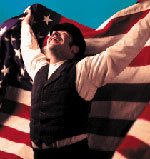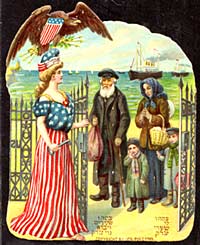 Is the United States a contractual community wherein members have implicitly divvied up the land to be realloted among property owners of real estate, capital, and market shares?
Is the United States a contractual community wherein members have implicitly divvied up the land to be realloted among property owners of real estate, capital, and market shares?
In the libertarian body of political theory, the issue of whether autonomous individuals or national borders win out in the tug-of-war for free movement is still contentious, explains an article by Per Bylund at the Mises Institute today--somewhat to my surprise. I thought libertarian ideas would naturally led to a philosophy of free movement, empowering the individual to declaim arbitrary national controls and lubricating the free movement of labor. And indeed Bylund points this perspective out as a classical view.
But for reasons of "realism" (too often a misnomer), I thought open borders impractical--not only for political reasons, but in terms of undermining public health controls, the state's obligation to protect, etc. The incumbent system of nation-states offers citizens a predetermined set of goods and services in exchange for taxes and loyalty; when illegal immigrants enter (despite the bounty they might provide to the illicit economy), they will (however politically incorrect to the ear) place some degree of financial drain on the system for which they do not pay, and indeed are not contractually entitled to pay.
However, the unorthodox argument of restricted borders the devil's advocate Bylund explores is more interesting. So here it is, the property-first theory of immigration controls:
Immigration will thus be naturally restricted in a free society, since all landed property (at least in the Western world) is rightfully owned by self-owning individuals. Just like Nozick argues in his magnum opus Anarchy, State, and Utopia, a society based on natural rights should honor property rights in absolute terms, and therefore the rightful owners of each piece of property should be identified despite the fact that humankind has been plundered by a parasitic class for centuries.What rules supreme, the de facto sordid system of the "welfare-warfare state" or the rebellious free-agent actors of the natural rights paradigm? (Sardonic scoff of the day: Can you imagine Congress actually continuing the immigration debate in these terms---heavens forbid, theoretical groundwork!)
Going back though, Bylund overturns the open-border argument primarily based on a fulcrum that assumes a naive anarchy would be the
 result. I don't think follows; isn't it possible to have minimal border control which requires, for instance, only a weapons check but otherwise only marks the political boundary between two different state-citizen contract zones/systems? Or am I being naive now? Can't travel freely and return home again? Bylund concludes, with the finesse of a diplomat:
result. I don't think follows; isn't it possible to have minimal border control which requires, for instance, only a weapons check but otherwise only marks the political boundary between two different state-citizen contract zones/systems? Or am I being naive now? Can't travel freely and return home again? Bylund concludes, with the finesse of a diplomat: With the state as it is today, should we as libertarians champion open borders or enforced property rights (with citizens' claims on "state property")? Both views are equally troublesome when applied within the framework of the state, but they do not contradict each other; they are not opposites.Right though he may be, I want to see blood--fight, fight, fight! Oh, alright, maybe just a good tussle astride the border then.




0 Comments:
Post a Comment